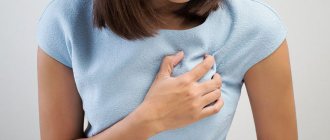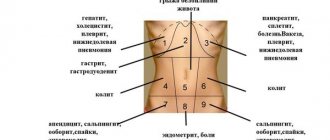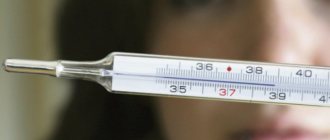Many representatives of the fairer sex experience pain due to premenstrual syndrome. This may be a consequence of active contraction of the uterus. Mild malaise and discomfort immediately before your period are normal. However, the condition can be caused by other reasons. If your stomach hurts before your period, pay attention to the condition as a whole. If you have a number of negative signs, undergo diagnostics to rule out possible pathological abnormalities. Sometimes the signs present may also indicate the progress of pregnancy. In this case, the woman will face further delays.
Stomach pain often occurs before menstruation
Medical therapy
If the doctor has diagnosed secondary algodismenorrhea, treatment will be aimed at eliminating diseases and changes in the woman’s reproductive organs that caused the painful condition.
Modern medicine methods can change the abnormal position of the uterus or separate adhesions. With endometriosis, it is possible to remove foci of the disease. There are gentle ways to remove fibroids. After eliminating the causes of algodismenorrhea, conservative treatment methods can be prescribed: hormonal drugs, antispasmodics and analgesics.
The primary form of the disease is treated with analgesics, antispasmodics, sedatives and hormonal drugs. If a woman is sexually active, she will be prescribed hormonal drugs with contraceptive properties.
When diseases of the nervous system become the cause of algodismenorrhea, the woman is prescribed tranquilizers. These are psychotropic medications that relieve anxiety and fear. With their help, it is possible to stabilize the mental state and eliminate or reduce pain. At the same time, the woman’s hysterics and depressed state disappear, her vitality increases.
Causes of pain syndrome
Stomach pain before or during menstruation can be caused by the following reasons:
- excessive sensitivity of the body to uterine contractions;
- pathology of the genital organs;
- incorrect position of the uterus;
- hormonal imbalances;
- susceptibility of the nervous system.
No less often, stomach pain can occur from improper and unbalanced nutrition. Therefore, a few days before the expected critical days, it is better to refrain from eating junk food.
Also, pain in the stomach before menstruation can occur due to gastrointestinal ailments. This discomfort can result from:
How to help yourself with PMS
Women most often use medications to treat premenstrual syndrome. For severe pain, they take potent drugs, which has a bad effect on the functions of the liver and kidneys.
It is worth trying to regularly use the knowledge of traditional medicine based on taking herbs and infusions. Some of them contain substances similar to estrogen, so they are able to normalize hormonal levels before and after menstruation.
Herbs that are recommended for use by women and girls:
- Nettle - contains a set of useful substances - vitamins, hemostatic substances. Has an anti-inflammatory effect, relieves menstrual pain. It is recommended to drink from the middle of the cycle until the end of menstruation.
- Oregano - used for delayed development of internal genital organs, as well as for pain in the lower abdomen.
- Potentilla goose - restores impaired metabolism, relieves pain, strengthens the immune system.
- Mitchell's wavy or wifey grass. It has a diuretic, tonic effect on the uterus and ovaries, and a calming effect on the nervous system. It is used for all forms of menstruation disorders. It is used in medicinal preparations for women, but grows only in the USA, so you can get it in ready-made tablets.
- Black cohosh or black cohosh - phytoestrogens, calcium, magnesium, and iron are concentrated in the root part. Vitamins A, C and group B.
- Viburnum – has antibacterial, hemostatic, anti-inflammatory properties. Pain relieves menstruation and relieves irritability.
- Ginseng - enhances metabolism, helps get rid of extra pounds, reduces high blood pressure, improves sleep, improves immunity.
- Borovaya uterus - used for inflammatory and tumor diseases of the female reproductive system, restores hormonal levels.
Treatment with herbs should be carried out regularly, it is advisable to start the course of treatment before the onset of pain - 1 - 2 weeks before menstruation.
Why do hormones affect the stomach?
Estrogen and progesterone are two hormones that regulate your menstrual cycle. Prostaglandins are a lipid or fat, a compound that actually acts as a hormone. There are different types of prostaglandins, one of them is specific to the female reproductive system. Like estrogen and progesterone, prostaglandin levels also fluctuate throughout the menstrual cycle.
It is not known exactly why the intestines hurt before menstruation and how this is related to hormonal changes throughout the cycle. However, it is known that sex hormone receptors are located along the gastrointestinal tract. Receptors interact with hormones and regulate certain physical responses.
Fluctuations in estrogen, progesterone, and prostaglandins during the menstrual cycle also cause changes in the muscles of the gastrointestinal tract that control digestion.
The presence of sex hormone receptors in the gastrointestinal tract causes pain in the stomach, intestines and digestive problems during menstruation.
- Progesterone is well known to cause constipation during pregnancy by slowing the movement or contraction of muscles in the gastrointestinal tract.
- On the other hand, estrogen tends to increase gastrointestinal motility and may cause diarrhea.
Prostaglandins, specific to the female reproductive system, play a role in the contraction of the uterine muscles, which can cause pelvic cramps. Because there are also sex hormone receptors along the gastrointestinal tract, as in the uterus, prostaglandins can potentially act on muscles in the gastrointestinal system. This may be why your stomach hurts before your period and you experience bloating.
How to remove pain
Medications and proven folk remedies will help reduce painful symptoms. First of all, it is necessary to reduce physical activity. You need to rest more, move less.
Any loads on critical days are kept to a minimum. It is forbidden to apply a hot or cold heating pad to your stomach. This method of “treatment” will not relieve pain, but will only intensify it and lead to complications.
It is allowed to use painkillers and non-steroidal medications. NSAIDs inhibit the production of prostaglandin synthetase. It is this substance that provokes pain. However, before using medications, it is advisable to consult a doctor.
Drugs
Medicines against pain should be taken not on critical days, but immediately before them. Only in this way can the unpleasant painful sensations be completely eliminated.
Antispasmodics, analgesics and NSAIDs help relieve pain. However, if the pain syndrome is caused by gastritis, it is not recommended to take non-steroidal drugs. It is undesirable to use Aspirin, it increases bleeding.
Table of medications for period pain:
| Name | Description of action | Dosage |
| No-Shpa (Drotaverine) | antispasmodic, reduces uterine contractility, reduces pain, the effect is noticeable after 20 minutes, lasts for several hours | 1-2 tablets when pain appears, if painful symptoms recur, take another tablet |
| Ibuprofen | NSAID, has an analgesic effect, suppresses the production of prostaglandins and platelet aggregation | Swallow 1 tablet with water, take with meals, you can take another tablet again, but only after 4 hours, no more than 3 times a day |
| Nurofen | NSAID, relieves pain and inflammation, inhibits PG synthesis, effect is achieved after 15 minutes, lasts up to 8 hours | 1 tablet during lunch, after 6 hours you can take another tablet, but no more than 3 times a day |
| Spasmalgon | NSAID, relieves spasms and pain, reduces the tone of the uterus and stomach | 1 table washed down with water, after 6 hours you can take another one, but no more than 3 pieces per day |
| Baralgin | NSAID, antispasmodic, relieves pain | 1 table washed down with water, no more than 3 pieces per day with an interval of 6 hours. |
| Solpadeine | analgesic, relieves pain, acts after 15 minutes. | Dissolve 1-2 tablets in water, after 4 hours you can take another dose, but no more than 4 times a day |
Folk remedies
Medicinal herbs can help with painful periods. Tinctures and decoctions are made from them. Folk remedies relieve pain attacks and improve the well-being of women. It is recommended to make medicinal tinctures before use and drink them warm.
Recipes:
- Horsetail tincture. Pour one spoon of herb into a glass of boiling water. Leave for 30 minutes. Drink a glass of tincture every three hours until the pain subsides.
- Chamomile decoction with cinnamon and cloves. Pour boiling water over one tablespoon of chamomile and cook for 10 minutes. Add a pinch of cinnamon and a couple of clove stars. Remove the broth from the stove and let it brew for 30 minutes. Drink a glass of tincture three times a day.
- Celery root tincture. Pour three tablespoons of chopped celery root into 500 ml of water and boil for 10 minutes. Let it brew for one hour. Take a glass three times a day.
- Douching with calendula. Pour boiling water over one spoon of calendula flowers and boil for 5 minutes. Let it brew for 30 minutes. Douche twice a day: in the morning and before bed.
- Fresh nettle juice. Squeeze one teaspoon of juice from the leaves of the plant and dissolve in half a glass of water. Take three times a day 10 minutes before meals.
How to eliminate pain
Since we have looked at the reasons why your stomach may hurt before your period, it’s time to tell you how to remove or minimize pain during the premenstrual period.
So, useful habits can relieve pain:
- cessation of alcohol abuse and smoking;
- light daily exercise after waking up;
- proper and healthier nutrition;
- use of hormonal drugs.
It won’t hurt to do light abdominal massages by stroking your hand clockwise, or take warm baths, for which you should use emollients and sedatives:
- herbal decoctions;
- aroma oils;
- foam, etc.
Nutrition plays an important role. To ensure that the body always has the strength to resist the negative effects of environmental factors, it is useful to include the following foods in the diet:
- quail eggs;
- fresh vegetables and fruits;
- herbal decoctions;
- foods high in protein.
The main causes of abdominal pain during menstruation
There can be several causes of pain in the abdomen:
- the uterus in the female body has a non-standard placement, as a result of which the organ puts pressure on the nerve endings;
- due to the peculiarities of the individual structure of the female body, especially sensitive pain endings are located in the peritoneum, and this, in turn, provokes the appearance of a painful feeling due to contractions of the uterus;
- inflammation of the genital organs.
If a woman does not have any problems in the field of gynecology, menstruation, as a rule, is painless and does not bring any inconvenience. The most common cause of pain is the presence of a gynecological disorder. The sudden onset of pain in the abdominal area may indicate the development of an infectious disease in women that is sexually transmitted.
The appearance of pain in the lower abdominal cavity indicates the presence of various hormonal disorders and disruptions in a woman’s body. This problem is most often observed in teenage girls who are just entering adulthood. This time is characterized by the passage of puberty, for this reason the girl’s monthly cycle has not yet formed, which causes hormonal changes in the body.
Sometimes pain appears in a situation where everything is in order in the field of gynecology and the woman does not have infectious diseases. The cause of such pain may be a weakened immune system due to changes in work schedule, stress, or lack of vitamins or elements in the body.
Is it possible to prevent pain?
It is easier to prevent discomfort than to eliminate it later. For this purpose, girls are advised to adhere to simple rules. First of all, you should give up any bad habits. Doctors do not advise drinking alcohol, smoking or using drugs.
This video will tell you why abdominal pain occurs before menstruation:
Any medications should be taken in consultation with your doctor. Self-medication of any pathologies is prohibited and can cause pain. Diet also plays a big influence. The menu should not include:
- fat;
- fried;
- pickled;
- overly sweet or salty.
It is better to give up coffee altogether or at least reduce its amount. It is important to lead an active lifestyle. Physical activity alternates with mental activity. Patients are recommended to do yoga or bodyflex. This is an excellent prevention of pain and other manifestations of PMS. A woman should be regularly examined by a gynecologist. This is necessary to exclude possible pathological symptoms.
What diseases cause pain before menstruation?
Pathological pain before the onset of menstruation is not always secondary; it can occur immediately after the formation of the cycle. In these cases they talk about congenital health disorders. Finding out the real cause of deterioration in health in adolescents and young girls is not easy, especially if an external examination and general laboratory tests do not indicate the presence of disorders.
Common diseases that may cause primary pain before menstruation:
- insufficient endocrine activity of the ovaries, adrenal glands, pituitary gland;
- connective tissue dysplasia.
In such conditions, pain begins to develop a week or earlier before the expected cycle, severe premenstrual syndrome with many somatic and nervous symptoms is likely:
- dizziness, headaches, migraines;
- blood pressure surges;
- heavy sweating;
- numbness of fingers;
- violation of thermoregulation;
- tachycardia;
- general swelling;
- the appearance of extra pounds;
- indigestion.
Often the bones and the whole body ache, the skin turns pale or red, and nagging pain of moderate or severe intensity appears in the abdomen.
With endometriosis, a typical sign, in addition to painful symptoms, is the specific nature of the discharge: it begins and ends with dark brown clots, indicating the presence of endometrial cells outside the uterine cavity.
It is very dangerous if sharp tearing or cramping pains appear suddenly shortly before your period. This may indicate progressive fibroids, an ectopic pregnancy, or an incipient miscarriage.
Adhesions in the pelvic area, salpingoophoritis, and cysts cause severe ovarian pain in almost all cases of morbidity. Algomenorrhea is often accompanied by disturbances in the menstrual cycle itself—delays in the onset of menstruation from several days to two or more weeks.
Many sexually transmitted infections occur latently, and in advanced cases they affect the uterus and appendages. A few days before the start of menstruation, under the influence of hormonal shifts, the pathogen is activated, causing a number of negative symptoms: severe itching and swelling of the external genitalia, burning, physical discomfort, the presence of strange discharge - abdominal pain can also appear for these reasons.
Diseases not related to gynecology, in which severe pain appears during the premenstrual period:
- acute or chronic appendicitis;
- intestinal obstruction;
- varicose veins of the small pelvis;
- passage of a stone from the bladder or ureter.
If these pathologies are associated with PMS, pain in the abdominal cavity can be mistaken for strong contractions of the uterus before menstruation.
Preventive measures and treatment
Preventing a disease is much easier than treating it. Let's consider a set of preventive measures that will help reduce the risk of stomach pain not only before menstruation, but also on other days of the menstrual cycle.
- Balanced diet. The load on the stomach is reduced.
- Refusal of alcoholic beverages and nicotine.
- Normal physical activity (move more and do morning exercises).
- If you had a stomach ache before your current period, then after it ends, it makes sense to go to the gynecologist, especially if you haven’t visited him for a long time. You may need a course of treatment that you cannot prescribe to yourself.
Such simple measures are very effective and will help reduce the risk of various pathologies, even those not related to the current problem.
Prevention is a good thing, but what to do if stomach pain has already come and does not allow you to live normally? It is necessary to solve two problems: relieve pain and eliminate the cause of its occurrence. In order not to constantly take painkillers, you need to consult your gynecologist.
If the problem arose due to hormonal imbalance, the doctor may prescribe treatment using hormonal contraceptives.
Diagnostic measures
What to do if your stomach hurts a lot during menstruation? Of course, consult a doctor. He will ask the patient about the sensations she experiences, as well as when, with what intensity and frequency her lower abdomen hurts, whether there have been gynecological diseases, surgical interventions, abortions or childbirth before, how puberty went, what heredity is. Already at this stage of diagnosis, it is possible to assume why severe pain is observed during menstruation.
An examination by a gynecologist and an ultrasound examination of the pelvic organs will detect changes. To confirm the diagnosis, the doctor will prescribe the patient a colposcopy (examination of the vagina and vaginal part of the uterus using a colposcope) or hysteroscopy (examination of the uterine cavity using a hysteroscope). Colposcope and hysteroscope are medical devices that allow detailed examination of the inner surface of the vagina and uterus, respectively.
During the examination, the gynecologist will take a smear from the vagina, cervical canal and urethra for examination. The woman will be given a blood test to check hormone levels and general blood and urine tests. In some cases, laparoscopy may be necessary. This is a method of direct optical examination of the abdominal organs. Diagnostic laparoscopy involves two small punctures into which manipulative instruments are inserted.
In addition, the doctor will definitely refer the patient to a consultation with a psychotherapist or psychologist.
Diagnostics
Pain in the lower abdomen before menstruation is a physiological manifestation that does not need to be treated. But if during this period the stomach and gastrointestinal tract hurt for a long time, then this condition requires seeking medical help.
First of all, you need to visit a gynecologist. If any pathology is detected, the doctor prescribes special tests. In some cases, an ultrasound examination (ultrasound) of the pelvis and abdominal organs is performed.
Based on the examination results, the specialist determines the treatment tactics. If the gynecologist does not detect any changes, then you should contact a gastroenterologist. He palpates the abdomen and prescribes an FGDS.
Stomach pain during menstruation that occurs due to gastrointestinal diseases (gastritis, peptic ulcer, etc.) should be treated. In some cases, the help of a psychologist may be required. The specialist identifies the psychological cause of the pain and helps the woman cope with it.
Causes of nausea before menstruation
Nausea during and before menstruation is a fairly common condition. It may be a symptom of your period and not cause serious concern. You don’t need to do anything, the bad feeling will go away after your period. However, there is a possibility that the reasons are much more serious and require attention.
PMS
Before menstruation, most women experience premenstrual syndrome caused by hormonal changes. PMS is characterized by skin rashes, the stomach swells, and the breasts become swollen and tender. Depression, migraines and lower back pain occur less frequently. All these symptoms are a result of hormone imbalance.
Hormonal pills
Hormonal contraceptives and drugs that affect hormone levels disrupt the balance in the body. Their use before menstruation sometimes causes nausea, emotional instability, and headaches may occur.
Tampons
Using tampons can cause toxic shock, causing nausea, vomiting and dizziness. Associated with the body’s reaction to their composition. Symptoms appear during the first use, tampons should be discarded immediately. Try several types with different compositions and determine which ones are suitable for your body.
Pregnancy
Often the cause of nausea is a frozen or ectopic pregnancy. If your period does not appear on time, you should do a test. Pregnancy should not be ruled out if there is no delay. Scanty discharge, bleeding, accompanied by weakness, poor appetite and nausea are reasons to visit a doctor. If the situation is confirmed, nausea may be a manifestation of toxicosis.
Other causes of stomach pain before menstruation
During ovulation, a woman's hormone levels change dramatically. In the absence of conception, the reverse process occurs, and the uterus must prepare for endometrial rejection. To do this, it needs to begin to contract vigorously, and the canal in the cervix needs to expand. The body begins to produce substances called prostaglandins. Diseases of the nervous, endocrine or reproductive system can provoke their excess.
Research has proven that prostaglandins have anti-inflammatory, healing and anti-ulcer properties. They also stimulate smooth muscles to contract. An insufficient amount of these substances in the body causes irritation of the gastric mucosa. At the same time, prostaglandins are “responsible” for mood in the period before menstruation. The lower their level, the worse the woman feels. The main symptoms of their deficiency are depression, stomach pain, and abdominal discomfort during menstruation.
Due to low levels of prostaglandins, you can get gastritis or ulcers. Stomach pain can be caused by poisoning, after eating stale food (during PMS, the immune system is weakened) or due to simple indigestion.
Lower back pain during menstruation
One of the most common complaints of girls and women during menstruation is lower back pain. It’s hard not only to bend over, but also to sit, stand, and walk. My lower back ache, I want to lie on the bed all day and do nothing. From the lower back, pain can radiate to the legs, which makes the discomfort even worse.
Nagging pain in the lower back does not always occur for harmless reasons. To assess the severity of a single case, it is necessary to trace the trend over the period of their occurrence. Each of them and the possible causes of painful menstruation during this period of time are listed below.
- Pain before menstruation:
- a violation of the water balance, which manifests itself in a woman at the beginning of the cycle in the form of edema due to stagnation of fluid in the body;
- physiological features of the location of the uterus, such as its deviation towards the spine (before menstruation, uterine spasms can affect the muscles of the spine and cause pain in the lumbar region);
- reduced pain threshold (uterine contractions before menstruation are quite weak, but the woman can feel them).
- Pain during menstruation:
- spasm of the back and pelvic muscles;
- hormonal imbalance and the production of large amounts of the hormone prostaglandin
, which leads to increased contraction of the uterus and increased pain radiating to the lower back; - physiological features of the location of the uterus;
- intrauterine contraception (pain occurs due to the presence of a foreign object in the cervix and a large amount of hormone released by the IUD);
- water balance disturbance;
- unacceptable physical activity, which can lead to prolapse of the uterus and very serious consequences, including surgery;
- inflammation of the genitourinary system;
- pregnancy developing in the fallopian tubes (there may be menstruation during such a pregnancy, but the fetus puts pressure on the fallopian tubes, and they can cause spasms in the lower back).
- Pain after menstruation:
inflammatory processes in the genitourinary organs (vulvitis, endometritis, adnexitis, endometriosis).
Treatment options
The simplest and most common method is to take a painkiller or antispasmodic. You can also apply dry heat (a heating pad wrapped in cloth), which will relax tense muscles and relieve pain.
In the presence of inflammatory diseases, treatment is prescribed by a doctor, as in the case of discomfort due to the intrauterine device.
How to relieve intestinal pain
In addition to changing your diet, other remedies can be used for intestinal pain. If you do not want to resort to the use of medications, you should try herbal infusions. The most effective of them for use during menstruation is considered to be a decoction of oregano. It helps relieve swelling, eliminates cramps and at the same time helps normalize the menstrual cycle.
Of the medications, it is recommended to use only painkillers - analgin, Drotaverine, No-shpa. You can also use sorbent preparations, the most common of which is activated carbon.
But remember: if you often experience discomfort in the intestines during menstruation, find a gynecologist who can help solve this problem. If your body has problems, then only qualified treatment will eliminate them and bring it back to normal.
Why does pain occur?
The sensations may be due to various root causes, which are described in the table.
| Increased prostaglandins | For this reason, pain in women occurs in approximately 70% of women. The condition is accompanied by minor discomfort in the lower abdominal cavity. The symptom may extend to the lumbar region. |
| Product sensitivity | During menstruation, excessive sensitivity to certain foods may occur. This leads to stimulation of the walls of the gastrointestinal tract. Discomfort and nausea occur. |
| Diseases of the genital organs | Pain can occur due to inflammatory processes in the reproductive organs. In this regard, discomfort may affect the upper and lower abdominal cavity. Also, the appearance of the symptom may be affected by the incorrect location of the uterus. |
| Hormonal imbalances | Changes in hormone levels also lead to stomach pain. |
| The body's sensitivity to uterine contractions | During menstruation, the uterus contracts. This provokes the appearance of a painful sensation. The intensity of the symptom may vary. |
| Sensitivity to nervous system pathogens | Pain syndrome can be a consequence of: • stressful situations; • depression; • emotional outbursts; • nervous work. All these factors provoke pain in the abdomen. |
| Gastrointestinal diseases | At the time of menstruation, a girl’s body weakens. There is an exacerbation of existing gastrointestinal pathologies. The pain can be excessively intense, and the woman needs emergency medical help. |
| Tumor processes | Stomach pain with tumors is not the only pathological symptom. In addition, there is nausea and vomiting, as well as bloody spots in the vomit. |
| Binge eating | It is highly undesirable to overeat during menstruation. This always provokes the appearance of heaviness and pain in the stomach. Portions should be small. |
| Alcohol consumption | In this case, ethyl alcohol, which is a kind of toxin, enters the already weakened body. The patient's condition deteriorates significantly. This leads to intense pain. |
Sometimes pain is a consequence of food poisoning. This is due to the penetration of pathological microorganisms into the body. The condition is accompanied by weakness, vomiting, upset stool, and increased body temperature. A woman needs the help of a doctor.
Folk remedies
In order to relieve stomach pain at the beginning of menstruation, you should follow some general recommendations:
- You should try to include foods enriched with vitamins and fiber into your diet as much as possible;
- Avoid drinking alcohol and caffeine-containing drinks;
- Night rest should be at least eight hours;
- Perform regular health-improving physical exercises;
- A bath with fairly warm water will help relax your muscles and relieve stress.
If unusual changes appear in the body during the premenstrual period, you should definitely consult a gynecologist.
For stomach pain, an infusion prepared according to the following recipe will help:
A glass of fresh viburnum berries is boiled in three liters of water, then infused for 24 hours. If the berries are dried, then pour half a glass into the same volume of water. After a day, the infusion is heated to 40 degrees and two glasses of grated chaga are added to it. The resulting decoction with the mushroom is infused for another two days, then filtered, and aloe juice and honey are added to it, in the amount of 100 and 300 grams, respectively. Drink the decoction half an hour before meals three times a day, half a glass. The course of treatment with decoction is 3 weeks.
Severe pain 3–5 days before your period
Severe pain during menstruation, which manifests itself immediately before menstruation, is a reason to think that you may need to see a doctor. One of the reasons why the stomach hurts a lot before menstruation is inflammation of the female genital organs, the consequences of which can be the loss of their main function, which is to bear a fetus. Other pathological processes, including infectious ones, can also initiate the occurrence of severe and nagging discomfort.
Uterine fibroids
Myoma is a benign tumor of the muscular wall of the uterus. Very common among middle-aged women, especially those who use oral contraceptives. Pathology has the form of one or several nodes localized in different areas of the organ:
- in the cervix (such a tumor is called cervical);
- thicker than the myocytes of the wall (intermuscular);
- areas adjacent to the peritoneal cover (subperitoneal);
- lower part of the lateral rib (interligamentous);
- closer to the uterine cavity, sometimes descends into the vagina or cervix (submucosa).
Thus, if your stomach hurts severely before your period, you should analyze your condition and seek medical help, since pain may be the first sign of uterine fibroids.
Endometrial pathology
Diseases of the endometrium of the uterus occur quite often. One of the most common is hyperplasia - a layer grows, the main function of which is to produce mucous secretion. In the worst case of this condition, its cells begin to protrude into the uterine cavity, in which case the woman is diagnosed with endometriosis.
Doctors diagnose endometriosis using ultrasound and hysteroscopy. However, women experience a number of symptoms that force her to consult a gynecologist. These include:
- severe pain before menstruation;
- abundant and long-term (more than seven days) regula;
- tingling in the lower abdomen;
- irradiation of pain to the sacral and lumbar spine, as well as to the buttocks and thighs.
In addition to the above manifestations, a woman may be bothered by cramping pain in the lower abdomen every month, and bleeding often begins a week before the expected onset of menstruation. All this threatens the penetration of infection through the damaged mucous membrane of the organ, which can cause sepsis and subsequent loss of reproductive function by the uterus.
Diseases of the genitourinary area
Pain before menstruation is a symptom of diseases of the urogenital organs, the most common of which is cystitis - an inflammatory process of the bladder that develops as a result of infection of its wall with pathogenic microorganisms.
Other genitourinary diseases are usually characterized by inflammatory processes in the uterine cavity. Pathologies may occur:
- on the inner surface of the organ itself, in its muscle layer. Combined inflammation is also possible;
- on one or both sides of the fallopian tube;
- in the ovary (unilateral and bilateral inflammation);
- pelvic peritoneum.
Treatment
Treatment of stomach pain that worsens during menstruation should begin a week before the onset of menstruation. Please note that only a doctor should prescribe medications!
To avoid a pathological process in a woman’s body when its defenses are weakened, it is useful to use vitamin complexes and sedatives. If the cause of the pain is an incorrect balance of hormones, the gynecologist will prescribe hormonal therapy, which will require taking pills for several months.
Diagnosis of very severe pain, how to determine the cause of unbearable abdominal pain
The causes of premenstrual pain can be clarified based on the results of a thorough examination. To complete the clinical picture, the doctor needs to have information:
- about the nature, regularity, intensity of pain;
- about the presence of accompanying symptoms;
- about the methods of contraception used by the patient;
- about previous diagnoses, if inflammatory gynecological diseases and methods of their treatment were previously identified;
- about the nature of the manipulations and surgical interventions previously performed on the patient (diagnostic curettage, hysteroscopy, abortion, course of the postpartum period).
Laboratory tests include:
- general and biochemical analysis of blood, urine, vaginal smears, scrapings from the surface of the cervix;
- bacterial culture, enzyme-linked immunosorbent assay, PCR method for identifying infectious agents if there is reason that pain may be a consequence of an infectious disease.
The condition of the uterus, appendages, and fallopian tubes can be judged by the results of ultrasound diagnostics, which helps to identify signs of inflammatory processes, as well as the presence of neoplasms in these organs (cysts, fibroids, fibroids). Using an ultrasound examination, the doctor can assess the condition of the fallopian tubes, identify narrowing of the cervical canal, the presence of scar tissue and adhesions. If the gynecologist does not find any reason to explain the presence of severe painful premenstrual syndrome, the woman is recommended to visit other doctors (endocrinologist, gastroenterologist, neurologist). You need to be patient, because diagnostic procedures may take one or two months, but you cannot retreat, since this is the only way to identify the original source of pain before the onset of menstruation.
Why does my stomach start to hurt before menstruation?
Many representatives of the fairer sex experience pain due to premenstrual syndrome. This may be a consequence of active contraction of the uterus. Mild malaise and discomfort immediately before your period are normal. However, the condition can be caused by other reasons. If your stomach hurts before your period, pay attention to the condition as a whole. If you have a number of negative signs, undergo diagnostics to rule out possible pathological abnormalities. Sometimes the signs present may also indicate the progress of pregnancy. In this case, the woman will face further delays.
Causes
Often pain, especially severe pain, is a sign that something is wrong in the body. But during menstruation, pain appears in almost all women. Therefore, you can sometimes come across the opinion that such pain is a distinctive feature of female physiology. Is it really?
Partly yes. Most absolutely healthy women experience discomfort and pain during menstruation. But often they are signs of some kind of disorder or disease. Therefore, you need to know the differences between normal and pathological. Listed below are the reasons that may be causing your period pain.
Physiological processes
The female body is much more sensitive to pain than the male body. At the same time, it is in the female body that cyclical changes occur monthly, associated with significant changes in hormone levels. This all affects the general well-being and the condition of the organs affected by these hormones.
Natural causes of pain before menstruation, also typical for healthy girls:
- High sensitivity to pain. During menstruation, the uterus contracts and can put pressure on nearby nerve receptors. Not everyone feels this, but with increased sensitivity, minor nagging pain will be felt.
- During this period, under the influence of pituitary hormones, the functioning of the renin-angiotensin-aldosterone system, which is responsible for fluid content in the body, is slightly disrupted. Minor swelling may occur, including in the area of the internal organs of the small pelvis, which also causes a feeling of heaviness and slight pain.
- Lack of endorphin. Before menstruation, the level of hormones that stimulate the synthesis of this natural painkiller drops sharply. Endorphin is the “hormone of joy”, so during menstruation not only does sensitivity to pain increase, but often the mood is also easily spoiled.
- Pain can also occur when the intestines are full due to excessively rich food the day before. In this case, it puts pressure on the uterus and prevents it from contracting normally.
- An intrauterine device was installed. Usually it provokes stronger contractions, so they are felt more clearly.
- Emotional or psychological overload, especially if this happened during the last week of the menstrual cycle.
Signs of pathology
Pain during menstruation can be caused by a huge number of reasons, including non-gynecological ones. This is due to the fact that the body is weakened at this time and is most susceptible to exacerbations of chronic diseases. But most often, malfunctions in the functioning of the endocrine system and diseases of the genitourinary system occur. Often, unpleasant sensations can occur a week or more before the bleeding begins.
The most common health problems that can cause excessive period pain are:
- Inflammatory processes in the organs of the genitourinary system due to hypothermia, sexually transmitted diseases or other infections.
- Post-abortion.
- Incorrectly selected hormonal contraception.
- The presence of adhesions of the walls of the uterus with surrounding organs and tissues after surgery or due to a chronic inflammatory process.
- Improper functioning of the thyroid gland.
- Luteal phase deficiency. This is a condition when the level of hormones responsible for the processes occurring in the genitals after ovulation is disrupted, that is, the changes necessary to prepare for pregnancy. In this case, there are often difficulties when trying to get pregnant.
- Excess estrogen. In this case, periods will not only be painful, but also heavy.
- High levels of prostaglandins, which causes the uterus to contract too much. It occurs more often in nulliparous girls.
- The presence of various formations (cancer, fibroids, cysts, polyps) in the area of the uterus and ovaries. They interfere with proper blood flow and the release of contents, which provokes increased contractions.
- Incorrect position of the uterus.
- Congenital anomalies of the genitourinary system.
- Ectopic pregnancy.
- Endometriosis.
- Varicose veins of the small pelvis.
All of the problems listed above can cause not only painful menstruation, but also various serious disorders, so they cannot be ignored. Therefore, be sure to consult a doctor if you feel very unwell before or during your period.
Why does my stomach hurt before my period?
In normal health and proper functioning of all metabolic mechanisms in the body, menstruation should not cause discomfort. The nature of pain during PMS in the stomach is aching, pulling, rather reminiscent of discomfort. If there is a history of gastritis or an ulcer, the pain becomes acute with pain in the epigastric region.
Premenstrual syndrome
Painful sensations can begin 10–14 days before menstruation and continue throughout the critical days. The first action of a woman or mother of a teenage girl: undergo diagnostics of the reproductive organs and endocrine system in order to exclude pathologies whose symptoms are similar to PMS.
Painful symptoms of premenstrual syndrome are accompanied by the following additional manifestations:
- aches in the lumbar region, tailbone;
- gastrointestinal upset, diarrhea, constipation;
- migraine;
- sore nipples;
- flatulence (bloating);
- swollen ankles, hands or face.
Such discomfort is usually associated with an abnormal position of the uterus or its congenital bend, and also occurs due to improper functioning of the glands of the reproductive system.
Psycho-emotional symptoms of PMS:
- sudden mood swings;
- frequent depression;
- insomnia;
- emotionality;
- photosensitivity;
- noise aversion;
- change in libido;
- irritability.
PMS often occurs as a subsequent reaction to an abortion. These signs may indicate the manifestation of premenstrual syndrome, and diseases or dysfunction of the thyroid and adrenal glands, which are responsible for the hormonal balance of the body.
Pregnancy
Symptoms of early conception are very similar to symptoms of PMS. The main difference between cyclic syndrome and pregnancy is delayed or scanty implantation bleeding, mistaken for menstruation. It is recommended to take a pregnancy test several days in a row.










